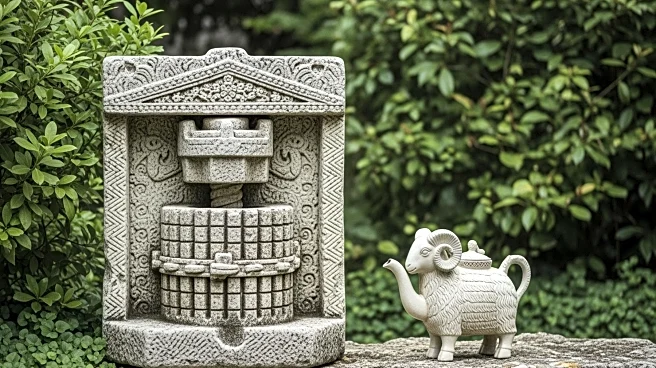What's Happening?
Archaeologists have unearthed a 3,300-year-old Canaanite 'tea set' near the ancient city of Armageddon in Israel. The discovery includes a teapot shaped like a ram and several small bowls, believed to
have been used for ceremonial purposes during the Late Bronze Age. The ram's head, molded into the spout, suggests the vessel was intended for pouring valuable liquids such as milk, oil, or wine. This find was made alongside a 5,000-year-old winepress, one of the oldest known, carved into rock with a sloping surface for grape treading. These artifacts were likely buried as ritual offerings by local Canaanites, possibly farmers, who could not access the nearby temple at Tel Megiddo. The excavation also revealed a miniature ceramic temple, providing insights into Canaanite religious practices.
Why It's Important?
This discovery sheds light on the cultural and religious practices of the Canaanites, a significant ancient civilization. The ram-shaped teapot and the winepress offer tangible evidence of the ceremonial and economic activities in the region during the Late Bronze Age. The findings contribute to understanding the development of urbanization and religious practices in ancient Canaan. The winepress, in particular, provides direct evidence of early winemaking, a crucial aspect of ancient economies and social rituals. These artifacts enhance the historical narrative of Megiddo, a site of immense archaeological and biblical significance, believed to be the location of the final battle in the Book of Revelation.
What's Next?
Further analysis of the artifacts will likely provide more detailed insights into the Canaanite culture and their interactions with neighboring civilizations, such as Egypt. The ongoing excavations may uncover additional artifacts that could offer a broader understanding of the region's historical and cultural dynamics. Researchers will continue to study the site to explore the extent of Canaanite influence and the role of Megiddo in ancient trade and religious networks.
Beyond the Headlines
The discovery highlights the importance of archaeological excavations in understanding ancient civilizations and their contributions to modern culture and society. It also underscores the need for preserving historical sites, as modern development projects, like road construction, often threaten these invaluable cultural resources. The findings may prompt discussions on the ethical considerations of archaeological practices and the balance between development and heritage conservation.











